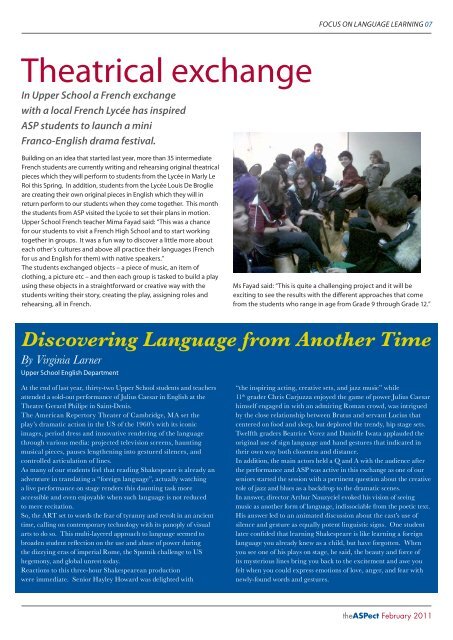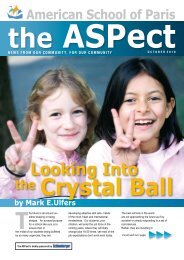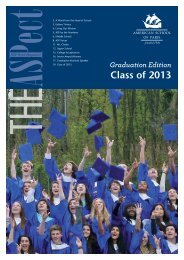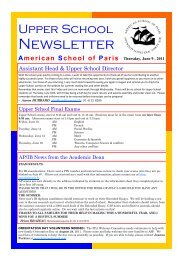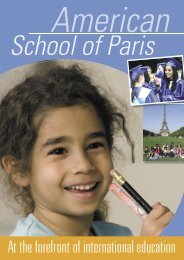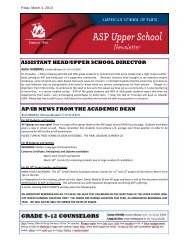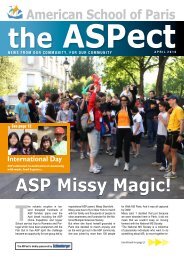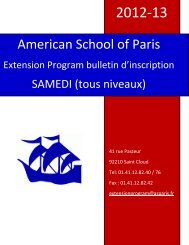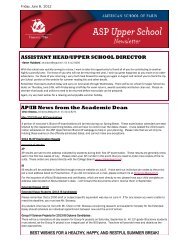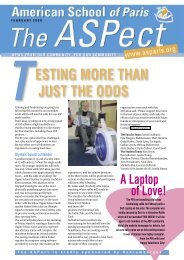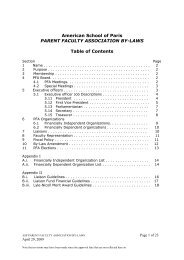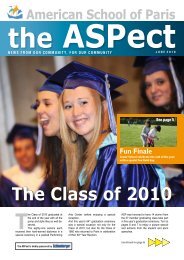ASPect 6fev 15h30.indd - American School of Paris
ASPect 6fev 15h30.indd - American School of Paris
ASPect 6fev 15h30.indd - American School of Paris
You also want an ePaper? Increase the reach of your titles
YUMPU automatically turns print PDFs into web optimized ePapers that Google loves.
FOCUS ON LANGUAGE LEARNING 07Theatrical exchangeIn Upper <strong>School</strong> a French exchangewith a local French Lycée has inspiredASP students to launch a miniFranco-English drama festival.Building on an idea that started last year, more than 35 intermediateFrench students are currently writing and rehearsing original theatricalpieces which they will perform to students from the Lycée in Marly LeRoi this Spring. In addition, students from the Lycée Louis De Broglieare creating their own original pieces in English which they will inreturn perform to our students when they come together. This monththe students from ASP visited the Lycée to set their plans in motion.Upper <strong>School</strong> French teacher Mima Fayad said: “This was a chancefor our students to visit a French High <strong>School</strong> and to start workingtogether in groups. It was a fun way to discover a little more abouteach other’s cultures and above all practice their languages (Frenchfor us and English for them) with native speakers.”The students exchanged objects – a piece <strong>of</strong> music, an item <strong>of</strong>clothing, a picture etc – and then each group is tasked to build a playusing these objects in a straightforward or creative way with thestudents writing their story, creating the play, assigning roles andrehearsing, all in French.Ms Fayad said: “This is quite a challenging project and it will beexciting to see the results with the different approaches that comefrom the students who range in age from Grade 9 through Grade 12.”Discovering Language from Another TimeBy Virginia LarnerUpper <strong>School</strong> English DepartmentAt the end <strong>of</strong> last year, thirty-two Upper <strong>School</strong> students and teachersattended a sold-out performance <strong>of</strong> Julius Caesar in English at theTheatre Gerard Philipe in Saint-Denis.The <strong>American</strong> Repertory Theater <strong>of</strong> Cambridge, MA set theplay’s dramatic action in the US <strong>of</strong> the 1960’s with its iconicimages, period dress and innovative rendering <strong>of</strong> the languagethrough various media: projected television screens, hauntingmusical pieces, pauses lengthening into gestured silences, andcontrolled articulation <strong>of</strong> lines.As many <strong>of</strong> our students feel that reading Shakespeare is already anadventure in translating a “foreign language”, actually watchinga live performance on stage renders this daunting task moreaccessible and even enjoyable when such language is not reducedto mere recitation.So, the ART set to words the fear <strong>of</strong> tyranny and revolt in an ancienttime, calling on contemporary technology with its panoply <strong>of</strong> visualarts to do so. This multi-layered approach to language seemed tobroaden student refl ection on the use and abuse <strong>of</strong> power duringthe dizzying eras <strong>of</strong> imperial Rome, the Sputnik challenge to UShegemony, and global unrest today.Reactions to this three-hour Shakespearean productionwere immediate. Senior Hayley Howard was delighted with“the inspiring acting, creative sets, and jazz music” while11 th grader Chris Carjuzza enjoyed the game <strong>of</strong> power Julius Caesarhimself engaged in with an admiring Roman crowd, was intriguedby the close relationship between Brutus and servant Lucius thatcentered on food and sleep, but deplored the trendy, hip stage sets.Twelfth graders Beatrice Verez and Danielle Iwata applauded theoriginal use <strong>of</strong> sign language and hand gestures that indicated intheir own way both closeness and distance.In addition, the main actors held a Q and A with the audience afterthe performance and ASP was active in this exchange as one <strong>of</strong> ourseniors started the session with a pertinent question about the creativerole <strong>of</strong> jazz and blues as a backdrop to the dramatic scenes.In answer, director Arthur Nauzyciel evoked his vision <strong>of</strong> seeingmusic as another form <strong>of</strong> language, indissociable from the poetic text.His answer led to an animated discussion about the cast’s use <strong>of</strong>silence and gesture as equally potent linguistic signs. One studentlater confi ded that learning Shakespeare is like learning a foreignlanguage you already knew as a child, but have forgotten. Whenyou see one <strong>of</strong> his plays on stage, he said, the beauty and force <strong>of</strong>its mysterious lines bring you back to the excitement and awe youfelt when you could express emotions <strong>of</strong> love, anger, and fear withnewly-found words and gestures.the<strong>ASPect</strong> February 2011


